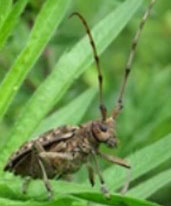Gene Editing in Monochamus Alternatus

Monochamus alternatus is a species of insect in the family Arboridae. As an important forest quarantine pest, the larvae of A. pineapple damage the phloem and xylem of the debilitating pine conducting tissue, destroy the transport of water and nutrients, and cause the wood to die. In the process of feeding and supplementing nutrients, the adult insects invade the pine trees by gnawing on the twigs, and the pine wood nematodes in their bodies invade the pine trees, causing the pine trees to be infected by the wounds, causing the pine trees to grow weak and eventually die in large areas.
Our Services for Gene Editing in Monochamus Alternatus
Monochamus alternatus is an important stem-boring pest of pine trees and the main vector insect of pine wood nematode, the devastating disease of pine trees. In the process of B. xylophilus dispersal and infestation, P. sylvestris plays a key role in carrying, spreading and assisting pathogens to invade their hosts. At present, the most widely used control methods are chemical control, biological control and trap control. The selection of high-yielding insect-resistant varieties is the most effective measure to control this pests. Lifeasible provides gene editing services for monochamus alternatus with zinc-finger nucleases (ZFNs), transcription activator-like effector nucleases (TALEN) and CRISPR/Cas9 to control them.
| Editable genes |
Relevant traits exhibited after editing |
MaltHSP20-5
MaltHSP20-11
MaltHSP70-2 |
- We can edit MaltHSP20-5, MaltHSP20-11 and MaltHSP70-2 to protect the proteins in the body of monochamus alternatus under heat stress and improve the thermal resistance of cells, thereby helping the body to resist heat stress.
- We can edit MaltHSP70-2 to reduce the protection of reproduction-related proteins. We also knockout the MaltHSP20-5 and MaltHSP70-2 genes to reduce the survival rate of male and female adult worms under heat stress.
|
| MaLac1 |
- We can edit the MaLac1 gene to affect the feeding habits of monochamus alternatus adults.
|
| MaMfe2 |
- We can knockout MaMfe2 to affect the normal biosynthesis and metabolism of monochamus alternatus.
|
| MaNCOA7 |
- We can knockout the MaNCOA7 gene to affect the metabolic process of monochamus alternatus larvae fat body or the physiological function of tissues and organs, and affect the ossification process of elytra and pronotum during the emergence of monochamus alternatus.
|
| orco |
- We can knockout the orco gene to reduce the potential changes caused by attractants, turpentine and sex pheromone, and also make the behavior of odor molecules appear random, which will affect the normal olfactory recognition process of monochamus alternatus.
|
Advantages
- Editing the reproductive-related genes make monochamus alternatus less viable and lost protection of reproductive-related proteins.
- Editing diet-related genes to affect the eating habits of monochamus alternatus.
- Editing olfactory recognition-related gens to affect the normal process of olfactory recognition in monochamus alternatus.
- Editing genes related to biosynthesis and metabolism interferes with the normal physiological and metabolic processes of monochamus alternatus, and affects the development of monochamus alternatus.
Lifeasible provides gene editing services for monochamus alternatus by three means include ZFNs, TALEN and CRISPR/Cas9 to affect the reproduction, the olfactory recognition and the development of this organism to control the harm caused by them. If you are interested in our services or if you have any questions, please click online inquiry for more detailed information.
Reference
- Liu, Q.S.; et al. Cloning and analysis of the NCOA7 gene of A. pineapple [J]. Southwest Agricultural Journal, 2017, 30(10): 2256-2262.
For research or industrial raw materials, not for personal medical use!
